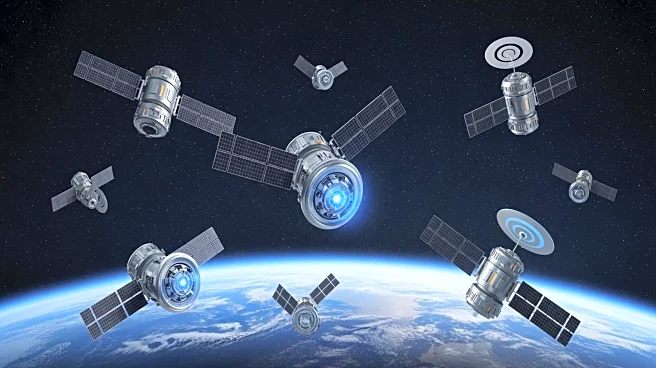What's Happening?
SpaceX's Starshield satellites are reportedly transmitting signals on unauthorized frequencies, potentially violating international telecommunication standards. According to NPR, amateur satellite tracker
Scott Tilley observed Starshield satellites broadcasting on frequencies typically reserved for uplink transmissions from Earth to satellites. This usage contravenes standards set by the International Telecommunication Union, which aims to prevent interference and ensure proper satellite communication. SpaceX's Starshield, a classified version of its Starlink network, is contracted to government agencies for national security purposes. The satellites are part of a network tasked with gathering Earth imagery for the Department of Defense's National Reconnaissance Office.
Why It's Important?
The alleged breach of telecommunication standards by SpaceX's Starshield satellites could have significant implications for international satellite operations. If these satellites interfere with other satellites' communications, it could disrupt global satellite networks, affecting industries reliant on satellite data, such as telecommunications, navigation, and weather forecasting. The situation underscores the importance of adhering to international regulations to maintain the integrity and reliability of satellite communications. Additionally, the involvement of SpaceX in national security projects highlights the growing role of private companies in defense and intelligence operations, raising questions about regulatory oversight and compliance.
What's Next?
If SpaceX's Starshield satellites are found to be violating international standards, regulatory bodies may need to intervene to ensure compliance. This could involve diplomatic discussions or legal actions to address the potential interference issues. The situation may prompt a review of how private companies are integrated into national security operations, potentially leading to stricter regulations or oversight. Stakeholders, including government agencies and international telecommunication organizations, will likely monitor the situation closely to prevent any adverse impacts on global satellite communications.
Beyond the Headlines
The development raises ethical and legal questions about the responsibilities of private companies in adhering to international standards, especially when involved in national security projects. It also highlights the potential for conflicts between commercial interests and regulatory compliance, which could influence future policies governing satellite operations. The incident may lead to increased scrutiny of private sector involvement in defense and intelligence, potentially affecting how contracts are awarded and managed.









